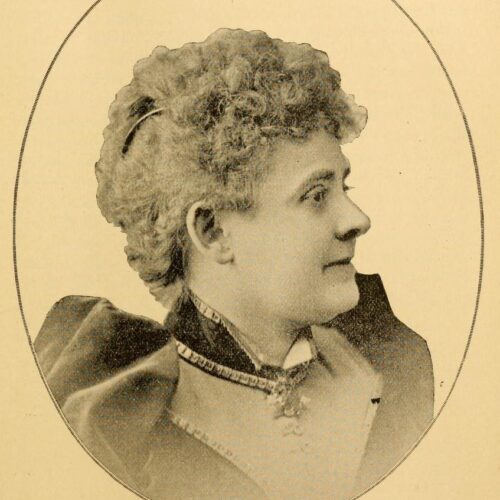

She was greatly gifted, and through her genial nature made friends everywhere. To the last she was an enthusiastic Rationalist, and she never missed attending the Annual Dinner of the R.P.A. when her engagements permitted.
‘Death of Mrs. Charles Watts’ in The Literary Guide, April 1924
Kate Eunice Watts was an actress, writer, lecturer and secularist, celebrated during her lifetime as one of the leading women of the freethought movement. Watts wrote on feminist issues as well as humanist ones, arguing for women’s right to education and equality. Born into a freethinking family in Nottingham, Kate Nowlan met prominent secularist Charles Watts during his visits to her home, and they married in 1870. She outlived him by 18 years. A rationalist to the end, Kate Watts’ non-religious funeral was led by F.J. Gould, and her ashes interred alongside Charles’ at Highgate Cemetery.
The accounts reproduced below come from tributes to Watts by her contemporaries, both during her life and following her death.
Mrs. Watts is gifted with fine elocutionary powers, and as an amateur actress has no superior, and she is a delightful contributor to the social entertainments of Freethought.
Samuel Porter Putnam in 400 Years of Freethought (1894)
From: 400 Years of Freethought (1894) by Samuel Porter Putnam
Kate Eunice Watts, wife of Charles Watts, is author of “The Education and Position of Woman,” and “Reasons for Not Accepting Christianity.” These are excellent pamphlets and rank Mrs. Watts among the leading Freethought women in England. Mrs. Watts is gifted with fine elocutionary powers, and as an amateur actress has no superior, and she is a delightful contributor to the social entertainments of Freethought. She is able also to make a fine address, if need be, on the platform. But she does not seek for any prominent position, only she is ready to aid the cause as far as she can with her brilliant gifts. Both in the United States and Canada she has made many friends in her cordial co-operation with the work of Mr. Watts, and no doubt in England the enthusiasm of her nature makes her equally popular.
From: The Literary Guide, April 1924
Death of Mrs. Charles Watts
Many friends will regret to hear of the death of the widow of Charles Watts, on February 25, in her seventy-sixth year. She was ill for little more than a week, and was fortunately spared any suffering. William Nowlan, the father of the deceased, was a well-known and much respected Freethinker in Nottingham in the latter half of the nineteenth century. When lecturing in the town Mr. Watts was accustomed to stay with the Nowlan family, and the intimacy thus started resulted a few years later in his marrying the elder of the two daughters. “Kate Eunice,” as she was affectionately addressed by Bradlaugh, Holyoake, and others, early displayed histrionic talent, and she was quite young when she as Miss Kate Carlyon joined Mr. Toole’s company. She remained with him until advancing years compelled him to relinquish management. Subsequently she toured America with an English company, and was generally hailed as a “star.” For family reasons she then retired from the stage, and returned to it only when necessity compelled her to do so.
“Kate Eunice,” as she was affectionately addressed by Bradlaugh, Holyoake, and others, early displayed histrionic talent… toured America with an English company, and was generally hailed as a “star.”
Mr. Watts died in 1906, without means (the lot of most Freethought pioneers), and his widow, though in her fifty-seventh year, courageously resumed her former occupation. She joined Sir Johnstone Forbes Robertson’s company, then about to produce “The Passing of the Third Floor Back” at St. James’s Theatre, London, and she continued with him until he retired from the stage. As is well known, Sir Johnstone toured America for several years, and Mrs. Watts accompanied him on each occasion. The strain was great, and it was accentuated when during the Great War years she visited the provincial centres of this country as a leading member of Sir John Martin Harvey’s company. About three years ago her memory began to fail her, and she had no alternative but to rest on her laurels. She was greatly gifted, and through her genial nature made friends everywhere. To the last she was an enthusiastic Rationalist, and she never missed attending the Annual Dinner of the R. P. A. when her engagements permitted. She is survived by her sister and an only daughter. Her remains were cremated at Golders Green, the service being conducted by Mr. F. J. Gould, who paid a beautiful tribute to her memory. The ashes will ultimately rest beside those of her husband at Highgate Cemetery, adjoining the grave of George Jacob Holyoake.
Mrs. Kate Eunice Watts is a woman of talent, and personally of exceptional grace and charm. During her husband’s occasional prolonged absence on Iecturing tours she edited Secular Thought, and that with spirit and capacity.
From the tribute of W. Stewart Ross (Saladin) on the death of Charles Watts (1906):
In one way Charles Watts was singularly fortunate. Mrs. Kate Eunice Watts is a woman of talent, and personally of exceptional grace and charm. During her husband’s occasional prolonged absence on Iecturing tours she edited Secular Thought, and that with spirit and capacity. She regarded Charles Watts as a propagandist of universal power, and attributed his failure to obtain his due need of recognition to his modesty and lack of self-assertiveness. There was no man like “Charlie”; she loved him with all the love and unselfish fidelity of a good and true woman’s heart. His lot was hard, as a Freethought propagandist’s lot must necessarily be; but it would have been harder still had he not been sustained by the unselfish devotion of her who loved him and has survived to mourn him with sorrow unspeakable.
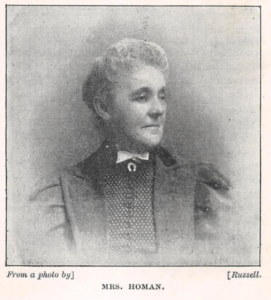
Ruth Homan was an educationist, women’s welfare campaigner, and one of the founding members of the West London Ethical Society […]
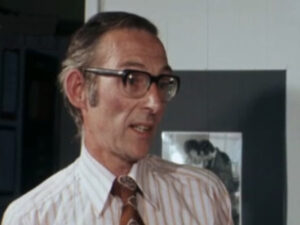
Belfast-born Jack McDowell was an activist, educator, politician, and atheist, whose humanism was evident in a lifetime of work for […]
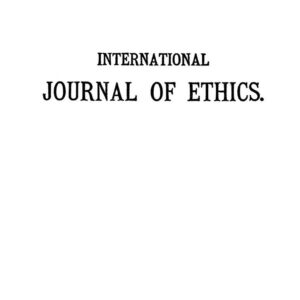
The International Journal of Ethics was founded in 1890 by leaders of the worldwide Ethical movement, ‘for the advancement of […]
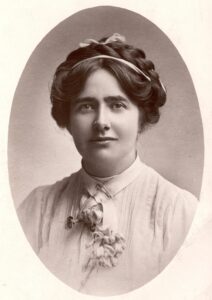
I am a feminist, a rebel, and a suffragist – a believer, therefore, in sex-equality and militant action. I desire […]